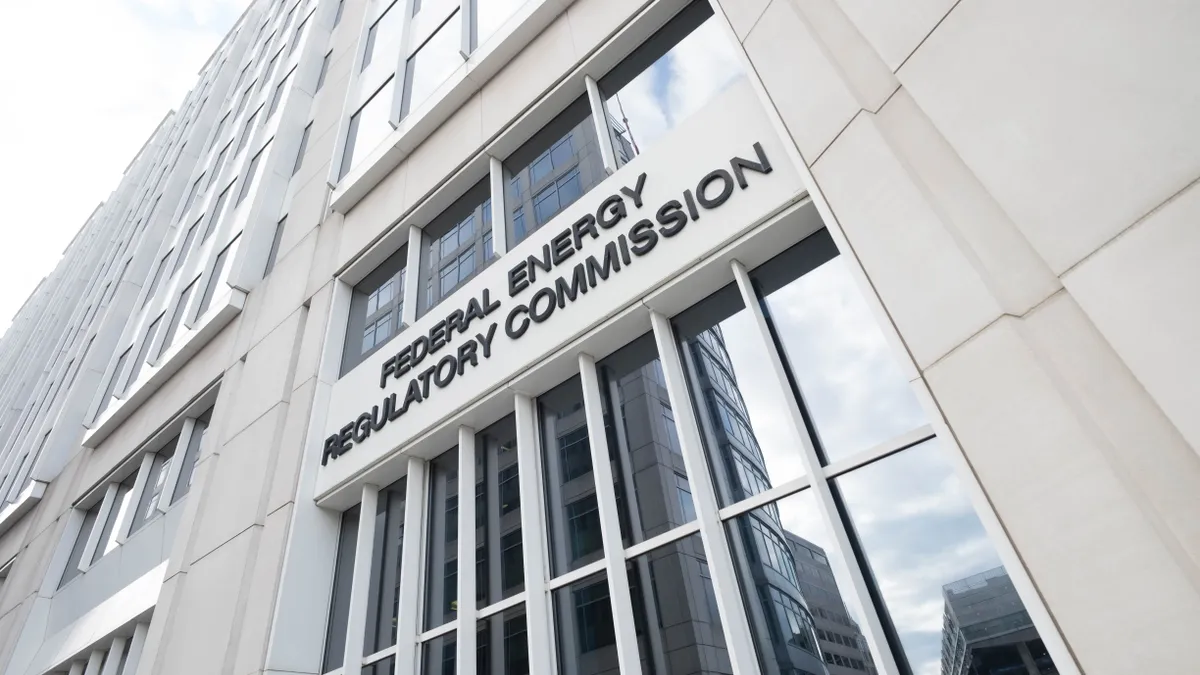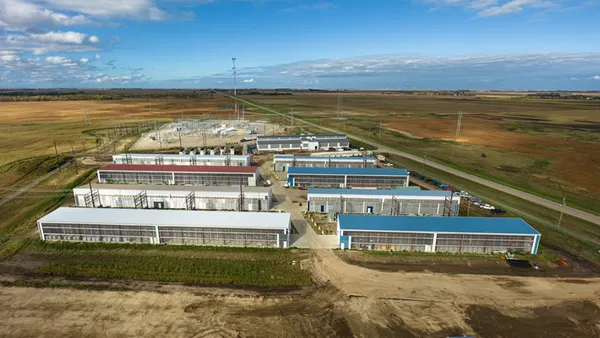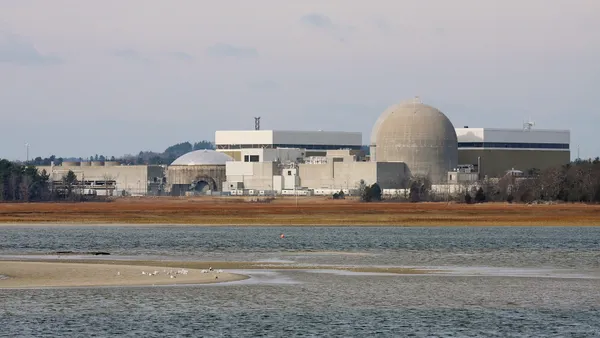Dive Brief:
- A wide group of energy stakeholders, including independent power producers, gas interests and clean energy advocates, are asking federal regulators to look more closely at the benefits of pricing carbon across wholesale electricity markets.
- Vistra Energy, NextEra Energy and others filed a request with the Federal Energy Regulatory Commission (FERC) on Tuesday, asking regulators to convene a technical workshop on carbon pricing and how it could benefit state clean energy goals. "With continued focus by states and utilities on policies that reduce carbon emissions from power generation," a better technical guide on how carbon pricing can play a role would be beneficial for stakeholders, the 13 groups wrote.
- States have increasingly come into conflicts with their wholesale markets over energy policy, in particular how to accelerate carbon reduction goals. Industry leaders say carbon pricing could provide at least a more consistent policy across territories that will give investors more long term certainty.
Dive Insight:
States have already begun to implement shades of carbon pricing policy across their territories, including the Regional Greenhouse Gas Initiative, which includes northeast and mid-Atlantic states, and California's cap and trade program. But some market players are concerned that having inconsistent policies across wholesale market territories creates uncertainty for long-term investments, and would like to see wholesale markets explore a more uniform approach.
"Companies and market participants realize that a patchwork approach by states is not as efficient or as effective as a more centralized approach could be," Todd Snitchler, president and CEO of the Electric Power Supply Association told Utility Dive.
Competitive power suppliers are seeing more aggressive emissions reductions policies by states, and so putting a price on carbon would provide a way for states to reach those goals and give market participants the certainty they need to operate, he said. The request to FERC also included gas generator Calpine, the American Council on Renewable Energy (ACORE), the Natural Gas Supply Association (NGSA) and the R Street Institute.
"As America's wholesale power markets weather unprecedented turmoil, thoughtful carbon pricing can serve as an effective complement to state policies like renewable energy standards which are designed to accelerate the transition to pollution-free, renewable power," Gregory Wetstone, president and CEO of ACORE, said in a press release announcing the move.
Several states have become frustrated with the policies of regional transmission operators, viewing them as an impediment to new clean energy goals, many of which aim for 100% carbon free energy by mid-century. New Jersey regulators recently launched a proceeding to investigate alternatives to PJM's capacity market, and Illinois has explored side-stepping the market through state regulation.
Because of that conflict, carbon pricing is one way to potentially better align those interests, according to a recent report from the New York University School of Law's Policy Integrity Institute.
"Recently, there has been another emphasis [on carbon pricing] because climate change is not going anywhere and we're not making ... enough progress," Burcin Unel, energy policy director at the Policy Integrity Institute and co-author of the report, told Utility Dive. And as more states began to pursue 100% clean energy goals "that kind of creates the impetus of ‘Okay, how do we do this with the context of energy markets?'," she said.
The market mechanism provides an avenue to improve economic efficiency and correct the "market failure" that leads to higher carbon dioxide emissions under current market structures, incentivizing groups to instead invest in cleaner fuels, according to the paper. Under such a model, resources would be dispatched based on the merit order of their social costs, prioritizing lower-emitting resources higher than most fossil fuel plants.
Companies with high-emitting assets, including NGSA members and other power companies with fossil fuel assets, would presumably be less receptive to such a proposal, but many are becoming more agreeable to climate and clean energy policies that favor market-based solutions.
"Our members are focused on solutions that will cut emissions, support innovations like carbon capture and protect consumers, without undermining the competitive markets that have already delivered enormous savings and lower emissions for consumers," NGSA spokesperson Daphne Magnuson told Utility Dive in an email.
And carbon pricing isn't the only market mechanism that could provide a uniform standard, said Snitchler. "Our base starting point, really, is that a market-based outcome or a market-based model that would price these externalities into the market" is the best way to align state policies with the maintenance of a competitive market, he said.
But industry support for these mechanisms does not guarantee effectiveness, Jessica Green, associate professor of political science at the University of Toronto told Utility Dive. In fact, those kinds of market mechanisms "really just entrench the structural power of fossil fuel companies and utilities, and we know that they already have a super outsized impact on climate policy," she said.
They also have proven ineffective across several countries that have tried to implement them because of political wariness about pricing carbon too high and the policy's limited scope that still allows major emitters to continue emitting. Actually implementing the mechanism takes massive amount of political will and regulatory manpower that would better be served implementing "command and control" regulations, said Green.
"The reason that power generators want it is because it's going to be much easier to comply with, i.e. less costly, than actual regulation," she said.
Correction: The EPSA does not support a Clean Energy Standard. An earlier version of this story mischaracterized the organization's position.














